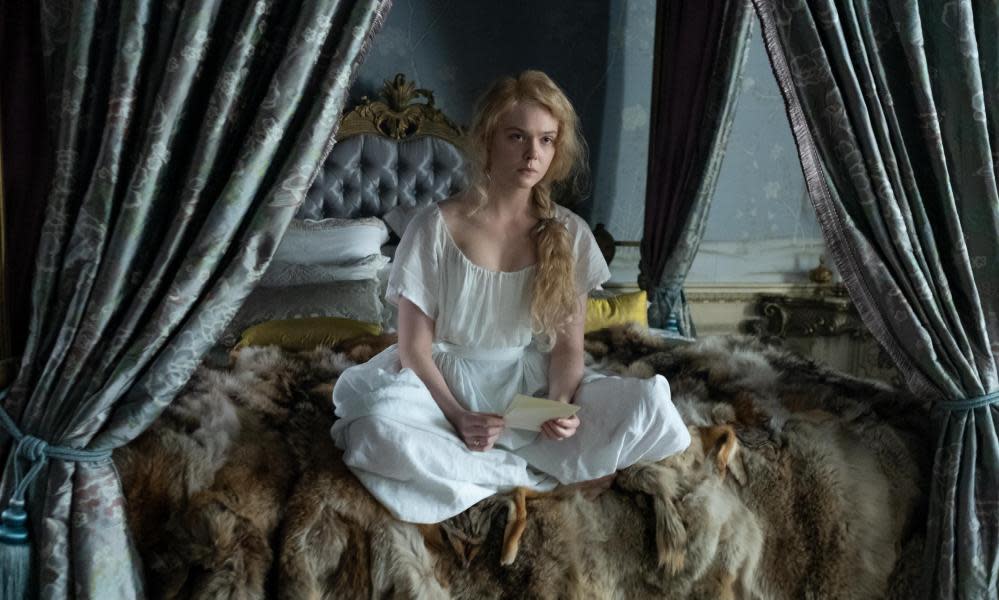The Great review – this imperious Catherine romp reaches for the tsars

The Great opens with an asterisk. “The Great,” read the credits, “*an occasionally true story”. It sets the tone admirably. And also acts as a deterrent to all those who thought they might be settling down in front of a new 10-part series by Starzplay devoted to an AJP Taylor-esque exploration of 18th-century Russia and Sophie of Anhalt-Zerbst’s rise to power from naive German bridal import to legendary empress Catherine the Great.
Instead, this is the story of Empress Catherine (Elle Fanning) for those who found the Helen Mirren thing last year a bit too taxing. And for those who find The Tudors too lacking in jokes and The Borgias just … too bad. In short, most of us.
It offers oblique commentary on the dangers of letting a capricious, narcissistic, bullying man-child rule a nation
We open in 1761, with aristocratic but impoverished but optimistic but naive young Soph sitting on a swing, regaling her friend with the news that she is soon to be married to Emperor Peter. “Of Russia?” says the friend. In real life, Catherine married the emperor (of Russia) in 1745 and by this point he was a year away from a coup d’etat. But again, if you are someone who already knows this and has been frothing since the beginning of the paragraph, this is not the satirical comedy/drama series for you. Go and read a big book, it’s fine.
Soon Sophie-known-as-Catherine-because-you-know-what-poshos-are-like is delivered to St Petersburg and Peter. He is played by Nicholas Hoult as Blackadder meets Tom Hulce’s Amadeus, and it’s brilliant. He inspects his blushing bride-to-be fiancee, who hands him a piece of evergreen spruce to symbolise their love. “She’s given me a twig,” he says, concerned, to his advisors. “She’s not another inbred, is she?” Reassured on this point, he resumes courtship. “You’re perfect,” he tells her. “Aristocratic but not powerful or a player. Your family, apparently, are fucked! … You smell funny. Is that usual?” “I’ve been travelling,” ventures his slightly discombobulated fiancee. “Let’s hope it’s that!” he replies, cheerfully, before heading off to hang with his bro-skis.
The Archbishop (Adam Godley) tests her religious faith (“How is your relationship with the Lord Our God?” “We’ve had no trouble”) and her hymen and pronounces her fit for purpose. Which, despite Catherine’s love of books, education and all things European and progressive, is to bear heirs (“Let’s hope my seed has found purchase! I must empty myself into you again soon” says Peter, because egomaniacal hedonists are rarely much with the foreplay) and play boules on the lawn with the “cruel and vapid” ladies of the court until Peter’s sack fills again.
Gradually Catherine finds a few friends and allies in the house of idiots: Marial (Phoebe Fox, and while I’m here – could we have more Phoebe Fox in our viewing lives, please?), a court lady with a brain but busted down to servant after her father incurred Peter’s wrath, and master strategist General Velementov – the butt of many of the emperor’s brutal practical jokes but whom he keeps around because, as Peter puts it: “He’s good at the thinking part of running the country.” As the mood and marriage darken, they are there to light her way to greatness.
Related: The best TV shows of 2020 so far
It is a romp, with every actor pitch-perfect in their role. Hoult has never been better, Fanning does a fantastic job as the Pollyanna with steel at her core, and Gwilym Lee as cuckolded Grigor Dymov hits his every scene out of the park. The script, adapted by Tony McNamara from his own play, shines – from the rapturous monologue in which Catherine imagines the pleasures of her forthcoming wedding night (“The man caresses you softly … your souls mesh … you fall into a black sky full of stars … end spent and unified!” “Ye-es,” says Marial. “That’s pretty much it”) to the throwaway gags scattered with a liberal hand.
The whole is possibly slightly overlong – eight episodes might have done better, especially if they lost some of the more gratuitously violent scenes that occasionally overstep even the broad bounds set by its comic and satirical intentions. But it also offers oblique commentary on the dangers of letting a capricious, narcissistic, bullying man-child rule a nation – to say nothing of the sublime satisfaction of watching someone not just capable coming up on the inside lane but also ruthless enough and sufficiently free of the trappings of modern western democracy to install herself forthwith. I mean, I’m not saying Keir Starmer and Joe Biden should really stage a bilateral coup on both sides of the Atlantic. I’m just saying they could watch this and take a few notes, you know? That would be great.

 Yahoo News
Yahoo News 
